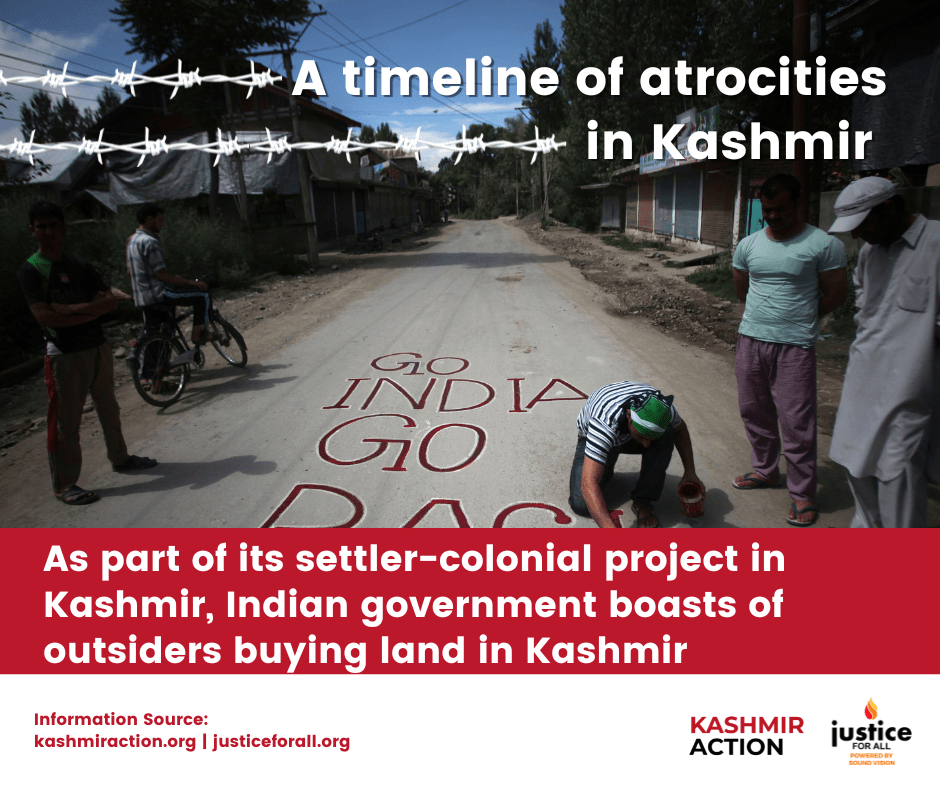
by Abdul Mussawer Safi 9 November 2023
In Kashmir, the Indian government is promoting its settler-colonial agenda through various means. The process of “delimitation,” which seeks to redraw the boundaries of electoral seats in the region, is one of the most critical and divisive aspects of the reforms. Parties in Kashmir are opposed because they fear it would dilute their political influence and help the Hindu majority in Jammu at the expense of the Muslim majority in the Kashmir Valley.
Another aspect of India’s settler-colonial endeavor in the area is the repatriation of the Kashmiri Pandits, a Hindu minority who fled the Valley in the 1990s as violence and carnage increased. To facilitate their readmission and reintegration, the Indian government has provided Pandits with jobs, protection, and homes. Controversies and hurdles have arisen in the form of a lack of trust and communication between Pandits and Kashmiri Muslims, local resistance to the creation of separate townships for the Pandits, and a recent wave of targeted murders of Hindus in the Valley. Kashmir and India’s settler-colonial enterprises are complex and divisive due to their far-reaching consequences for the region’s people, politics, and identity.
The ideology of the Hindu Rashtra, a Hindu nation-state, motivates India’s settler-colonial project in Kashmir, which aims to enslave and integrate the region’s Muslim inhabitants. India is working on this goal partly via the delimitation process, which gives more influence to the Hindu-majority Jammu region. The ultimate goal of this maneuver is to install a Hindu Chief Minister in Kashmir and reimpose Hindu Rashtra’s absolute Hindu dominance over the region’s Muslim population. Kashmiri Pandits, a Hindu minority, fled the area in the 1990s for economic and security concerns, but India is actively supporting their resettlement as part of its settler-colonial goal. India’s goal is to have Hindus from India move to Kashmir, changing the region’s population from Muslim to Hindu and thereby silencing any demands for independence from India.
In order to spread its propaganda and disinformation about the situation in Kashmir, the Indian government has been using Bollywood. Bollywood has a massive following in India and throughout the globe. However, its portrayal of Kashmiris as victims, terrorists, or separatists has been grossly inaccurate and dismissive of the region’s history, culture, and aspirations. Vivek Agnihotri’s The Kashmir Files is a fictionalized account of the exodus of Kashmiri Pandits from the Valley in 1990.
There have been charges that the film, which is based on video interviews with first-generation immigrants, is a crude propaganda work that exaggerates the violence and demonizes Kashmiri Muslims. Attendees at the International Film Festival of India (IFFI) were not enthusiastic about the film’s showing in the Indian Panorama section of the festival. The competition’s high criteria shocked Rahul Rawail, the jury chairman, so he publicly condemned the entry. The Pandit community in Kashmir has also spoken out against the film, calling into doubt its authenticity.
There is widespread speculation that the Indian government fabricated the plight of the Kashmiri Pandits who left the Valley in 1990 with the help of the film The Kashmir Files. The jury chairman, Rahul Rawail, said the film did not belong in the Indian Panorama section of the IFFI because it was too crass and too much like propaganda. The remarks were made in front of several government officials who had previously expressed their approval of the film on the record. The film has received much support from BJP leaders and ministers who believe it fairly represents the experience of the Kashmiri Pandits who were forced to leave their homes in the 1990s.
However, the film has been criticized for its portrayal of the Kashmir files Pandits from IIOJK, with some claiming it falsely suggests that Pundits were forced to leave the region out of fear of ethnic cleansing at the hands of Muslims. The video utterly ignores the violent persecution and human rights abuses that Kashmiri Muslims have endured at the hands of the Indian state and its security forces for decades. The Pandit minority in Kashmir has also spoken out against the film, challenging its accuracy and seeking a ban on its dissemination.
India has been waging a multipronged war against the people of Kashmir for a long time, and this film is just one more tool in their arsenal. The film’s ideology is reflective of Hindu nationalist ideals like Hindu Rashtra, which want to subjugate and assimilate the region’s Muslim population. Understanding India’s settler-colonial project in Kashmir and giving the aspirations of the Kashmiri people due weight is more crucial than ever.
